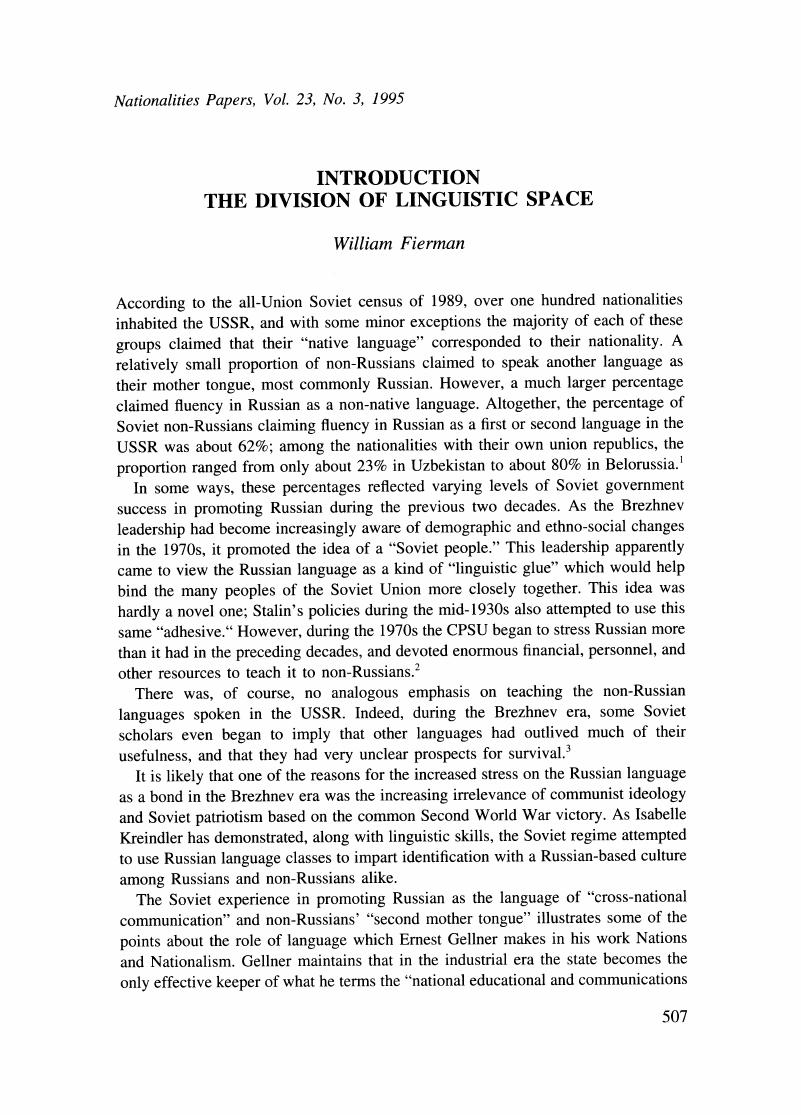Article contents
Introduction: The Division of Linguistic Space
Published online by Cambridge University Press: 20 November 2018
Abstract

- Type
- Introduction
- Information
- Nationalities Papers , Volume 23 , Issue 3: (Special Topic Issue) Implementing Language Laws: Perestroika and its Legacy in Five Republics , September 1995 , pp. 507 - 513
- Copyright
- Copyright © 1995 Association for the Study of Nationalities of Eastem Europe and ex-USSR, Inc.
References
Notes
1. Vestnik statistiki, No. 10, 1990, pp. 69–76; No. 11, 1990, pp. 73, 77; No. 12, 1990, p. 70; No. 1, 1991, pp. 63, 67, 70, 72, 76; No. 4, 1991, p. 76; No. 5, 1991, pp. 74, 78; No. 6, 1991, pp. 72, 76.Google Scholar
2. For a discussion of the role of the Russian language in the Brezhnev era view of the Soviet people, see Gerhard Simon, Nationalism and Policy Toward the Nationalities in the Soviet Union (Boulder, CO: Westview Press, 1991), pp. 313-33.Google Scholar
3. One author writing in 1971 stressed that “the right of all languages to unimpeded development does not mean that all languages without exception…must certainly develop….” (O. P. Sunik, “Nekotorye problemy iazykovogo stroitel'stva v SSSR,” Voprosy iazykoznaniia, No. 6, 1971, p. 23). (I would like to thank Isabelle Kreindler for bringing this passage to my attention.) In a similar vein, almost a decade later, the Uzbek linguist K. Kh. Khanazarov claimed some small groups had “learned from their own experience that the creation of a writing system and publication of various kinds of literature in their languages did not correspond to their true national aspirations and interests….” (Reshenie natsional' no-iazykovoi problemy v SSSR [Moscow, 1981], p. 97, cited in A. S. Kalmyrzaev, Natsiia i obshchestvennoe soznanie [Alma-Ata: Kazakhstan, 1984] p. 194). On a more personal level, I recall that when I was conducting research in Tashkent in 1977, the Deputy Head of the Uzbek Language Department at Tashkent State University (Ghulam Sharipov) told me in approving fashion, “It won't take more than one five-year plan for there to be just one language in the USSR.”Google Scholar
4. Ernest Gellner Nations and Nationalism (Ithaca, NY: Cornell University Press, 1983), pp. 51–52.Google Scholar
5. , Gellner p.35.Google Scholar
6. , See for example, I. B. Dzhafarov, Russkii iazyk—iazyk druzhby i bratstva (Baku: Azerneshr, 1982), pp. 52–53.Google Scholar
7. Pravda Vostoka 23 October 1975.Google Scholar
8. See Isabelle Kreindler, “A Second Missed Opportunity: Russian in Retreat as a Global Language,” International Political Science Review, Vol. 14, No. 3 (1993), p. 266.Google Scholar
9. For an overview of the laws see Nina Borisovna Mechkovskaia, “Status i funktsii russkogo iazyka v poslednikh sovetskikh zakonakh o iazyke,” Russian Linguistics 16 (1992), pp. 79–95.Google Scholar
10. This term was used by Valerii Tyshkov in a paper presented in Tel Aviv in October, 1993.Google Scholar
- 1
- Cited by


